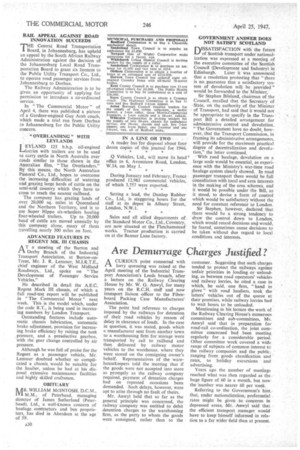Are Demurrage Charges Justified?
Page 32

If you've noticed an error in this article please click here to report it so we can fix it.
ACURIOUS point connected with lorry queueing was raised at the April meeting of the Industrial Transport Association's Leeds branch, after a lecture on the Railway Clearing House by Mr. W. G. Anwyl, for many years on the R.C.H. staff and now transport liaison officer to the Fibreboard Packing Case Manufacturers' Association.
The point had reference to charges imposed by the railways for detention of their road vehicles by reason of delay in clearance of loads. In the case in question, it was stated, goods which a 'manufacturer sent from another town to a warehousing firm for storage were transported by rail to railhead and then delivered by railway motor vehicles to the warehouse, where they were stored on the consigning owner's behalf. Representatives of the warehousekeepers told the meeting that if the goods were not accepted into store as promptly as the railway company required, payment of detention charges had on repeated occasions been demanded. Such delays, however, were apt to arise through no fault of theirs.
Mr. Anwyl held that so far as the general principle was concerned, the railway 'company was entitled to debit detention charges to the warehousing firm, as the party to whom the goods were consigned, rather than to the customer. Suggesting that such charges tended to protect the railways against unfair priorities in loading or unloading, as between road operators' vehicles and railway lorries, he cited a case in which, he said, one firm, "hand in glove" with road hauliers, took the latters' vehicles out of the queue at their premises, while railway lorries had to wait hours to be unloaded.
Mentioning in his lecture the work of the Railway Clearing House's numerous committees and sub-committees, Mr. Anwyl said that in preparation for road-rail co-ordination, the joint committee concerned had been meeting regularly for a considerable period. Other committee work covered a wide range of subjects of common interest to the railway companies and the public. ranging from goods classification and -` rates, to holiday excursions and advertising.
Years ago the number of meetings reached what was then regarded as the. huge figure of 60 in a month, but now the number was nearer 60 per week.
Referring to the Government's hint that, under nationalization, preferential rates might be given to concerns in depressed areas, Mr. Anwyl said that the efficient transport manager would have to keep himself informed in relation to a far wider field than at present.












































































